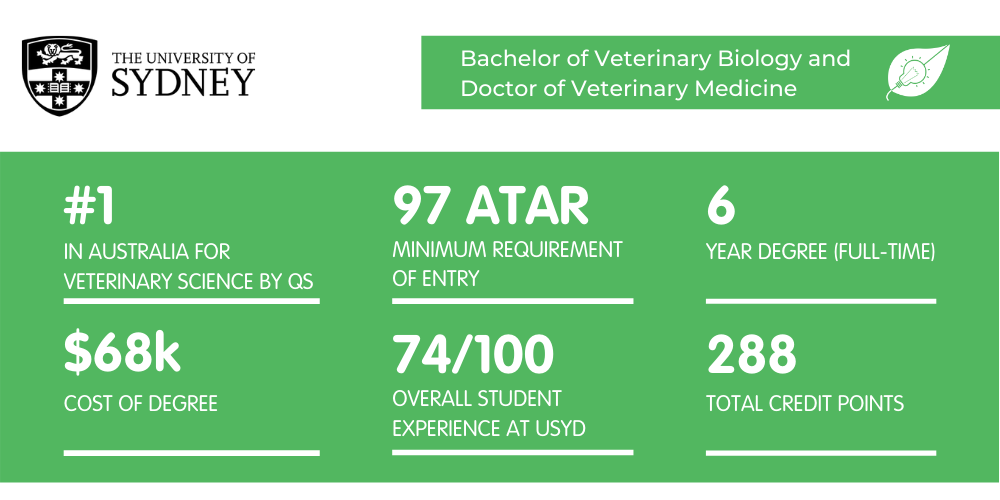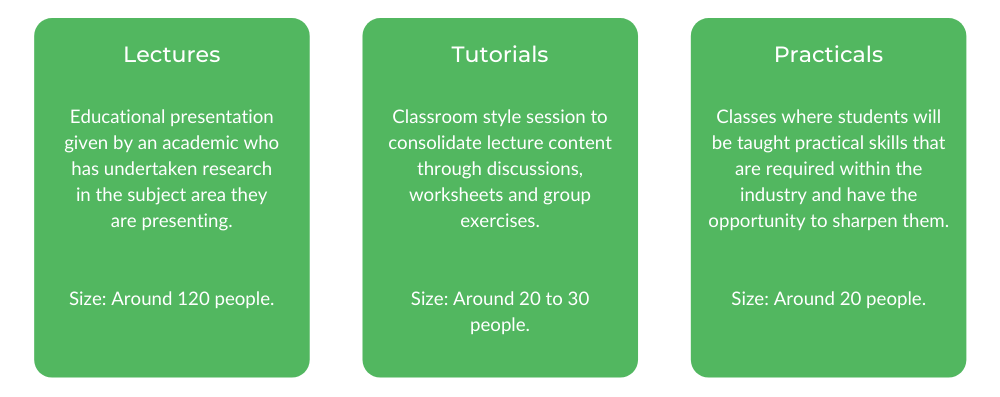
Have you felt an attachment to animals all your life? Is helping the lives of animals something you’ve thought about doing? Then studying a Bachelor of Veterinary Biology and Doctor of Veterinary Medicine at Sydney Uni is one of the ways that you can turn your passion into a career!
This article goes what you’ll need to know before applying for a BVB/DVM — let’s dive in!
What is a Bachelor of Veterinary Biology and Doctor of Veterinary Medicine at Sydney Uni?
Core Units for this Degree
How to Get into Veterinary Biology at Sydney Uni
What’s the Teaching Format?
What’s the Faculty and Culture Like?
What is a Bachelor of Veterinary Biology and Doctor of Veterinary Medicine at Sydney Uni?
A Bachelor of Veterinary Biology and Doctor of Veterinary Medicine is a course that provides the scientific knowledge, practical and research skills to enter a veterinary profession. Upon graduation, students can register to practise veterinary medicine within Australia, the United Kingdom and South Africa!
Theoretical teaching mostly takes place on the Camperdown campus while practical skills such as animal handling are learned on the Camden campus.
The Bachelor of Veterinary Biology precedes the Doctor of Veterinary Medicine and must be studied together to have professional accreditation from the Veterinary Surgeons’ Board.
Career Paths
There are various career pathways for graduates in a Bachelor of Veterinary Biology and Doctor of Veterinary Medicine at USyd. The most common are Private Veterinarian and Corporate Veterinarians. However, other fields of work include:
-
- Animal welfare
- Biosecurity
- Wildlife Conservation
- Infectious Disease Units
- Public Policy
Core Units for this Degree
Every unit in a Bachelor of Veterinary Biology and Doctor of Veterinary Medicine at USyd is a core unit, and there are no majors in this course.
During the two-year undergraduate stage, the core units of a Bachelor of Veterinary Biology focus primarily on biology, chemistry and statistics, and less on animal handling. Some of the core units include:
In a Doctor of Veterinary Medicine, the core units focus on navigating veterinary professional life, practical skills, research and enquiry, and other theory on veterinary science. These units include:
The two Foundations of Veterinary Science units and two Principles of Animal Disease have a high weighting of 12 credit points each.
In the Foundations of Veterinary Science units, students learn the body systems and anatomical, physiological and histological knowledge of domestic animals, as well as preventative and therapeutic treatments.
The Principles of Animal Disease units investigate disease and the manifestation of disease in the body systems of domestic animals, production animals and wildlife.
Placements
There are nine placements to complete during a Doctor of Veterinary Medicine! These include practical, preclinical and preparatory clinical placements such as working in the Horse and Dairy Cattle industry, in the university veterinary hospital as well as commercial partner practices.
How to Get into Veterinary Biology at Sydney Uni
The ATAR cut-off for a Bachelor of Veterinary Biology and Doctor of Veterinary Medicine at USyd is 97 and applicants must complete a statement of commitment to veterinary science.
Assumed Knowledge
The assumed knowledge for the course is Mathematics Advanced, Chemistry and Physics. If you haven’t taken these subjects, just keep in mind that content will be delivered in the sense that all students have this prior knowledge. Biology is also a recommended subject.
Alternate Pathways
There are other entry pathways other than meeting the ATAR cut-off!
Graduate students can study a Doctor of Veterinary Medicine at USyd if they have successfully completed one semester of study in general chemistry (physical and inorganic), biology, biochemistry and organic chemistry at a Bachelor’s degree level.
Since entry to the course is highly competitive, graduate applicants should have also achieved a strong Grade Point Average (minimum credit average).
Scholarships
A Bachelor of Veterinary Biology and Doctor of Veterinary Medicine at Sydney Uni has quite a hefty course fee because of the length of the course. So, looking and applying for scholarships can relieve some of these fees for eligible students!
The Dr John Holt Scholarship for Animal Welfare is a scholarship offered for first-year Doctor of Veterinary Medicine students and is valued at $6000 p.a. for four years.
For regional or rural students, the Dalara Foundation Scholarship can be especially helpful as it has a value of $50000 p.a. for the entire duration of the undergraduate and postgraduate course!
What’s the Teaching Format?
In a Bachelor of Veterinary Biology and Doctor of Veterinary Medicine at Sydney Uni, classes are taught in a combination of lectures, tutorials and practicals, and in semesters.
Class Structure

Lectures
The lectures are the length of a standard time slot in USYD, which is about 50 minutes each lecture. Like with any other degree, the lectures are quite big in class size, and classwork only sets out the unit’s general foundational content.
In a Bachelor of Veterinary Biology, most classes have students from undergraduate science degrees. During a Doctor of Veterinary Medicine, the whole grade attends the lectures, which is approximately 120 people.
Tutorials
The usual length for tutorials and practicals is about 2 hours and have 20 to 30 students attending. Generally, tutorial classwork focuses on problem-solving with scientific principles and mathematical calculations and in a Doctor of Veterinary Medicine, this includes working through clinical cases.
Practicals
In a Doctor of Veterinary Medicine, two days of the week are dedicated to practical skills, which typically involves driving to the Camden campus for animal handling. This is where the university farms are located so that students can get exposure to working with cattle, sheep, pigs and horses!
Animal handling practicals are split into six groups of 20, each with a different timetable for which practical they will be doing on what day.

How much time do you spend on campus?
In a Doctor of Veterinary Medicine, students typically have classes everyday from 9am to 5pm, with an hour’s lunch break. On some days, students may finish at 4pm and some animal handling practical days are shorter.
Considering this, the contact hours for a Doctor of Veterinary Medicine would be around 30 hours a week!
While a Bachelor of Veterinary Biology may involve fewer hours, students still need to be at university for five days of the week.
Assessments
The main assessments in a Bachelor of Veterinary Biology and Doctor of Veterinary Medicine vary depending on the year of study and the units.
For content-heavy units, students have a couple of exams throughout the semester with a final exam weighing 50% or more towards the student’s final mark.
In the first year of a Doctor of Veterinary Medicine, the practical skills units do not have any assessments! Students pass the unit so long as they have 100% attendance.
At the end of the second year of a Doctor of Veterinary Medicine, there is a practical exam called the Objective Structured Barrier Examinations (OSBEs), where students go through stations that test their practical skills. Students will need to redo the stations that you fail in a makeup exam, as they will need to pass all stations to progress.
However, there are plenty of chances to practice throughout the year, and staff try to help you as much as they can!
Skills That You Refine and Learn

The three main skills students in a Bachelor of Veterinary Biology and Doctor of Veterinary Medicine refine are:
-
- Animal Handling
- Clinical
- Scientific Research
With a heavy time commitment to placements in farms, vet clinics and other industries, students refine their professional skill in handling animals through a learned understanding of animal behaviour, movements and the scientific foundations behind them. This is key to being professional, ethical and responsible in all areas of veterinary activity, as well as keeping themselves, classmates and their future colleagues safe.
As many graduates will go on to work as veterinarians, their clinical skills are sharpened throughout the whole course and especially during their Doctor of Veterinary Medicine. By applying veterinary assessment methods, students will use their evidence to form solutions for the client’s needs, such as animal health, production and performance.
A Bachelor of Veterinary Biology ensures that all veterinary students are competent in the foundation of their work!
Basic chemistry, biochemistry and biology underpin their postgraduate work before they specialise into veterinary research. Through field experiments, clinical trials, statistical analyses and other scientific research methods, students gain a critical eye for evaluating evidence.
What’s the Faculty and Culture Like?
Faculty
Since Bachelor of Veterinary Biology and Doctor of Veterinary Medicine students spend most of their week in university classes, it is important that the faculty bolsters their students’ confidence. At Sydney Uni, Veterinary Science staff are generally very supportive and want to help students maximise their potential. Jessie finds that the staff ‘really enjoy teaching and like having students that are excited and curious’!
The facilities and vet hospitals are well-stocked and up-to-date, especially during the Doctor of Veterinary Medicine. In addition, students can get quite close to the cohort in the postgraduate years, since students have all their lectures together and some tutorial and practicals. It is helpful to lean on your friends during these stressful times!
Culture
It can be hard for Veterinary students to fit in societies because of the contact hours and if they do not live near campus. However, VetSoc is a great society to join as they hold many fun events such as trivia nights, Q&A sessions and picnics.
There are also several student-run groups that cater to specific areas of interest for students, such as the Pathology Interest Group and the Equine Specific Interest group!
Lynn Chen is a Content Writer at Art of Smart Education and is a Communication student at UTS with a major in Creative Writing. Lynn’s articles have been published in Vertigo, The Comma, and Shut Up and Go. In her spare time, she also writes poetry.


